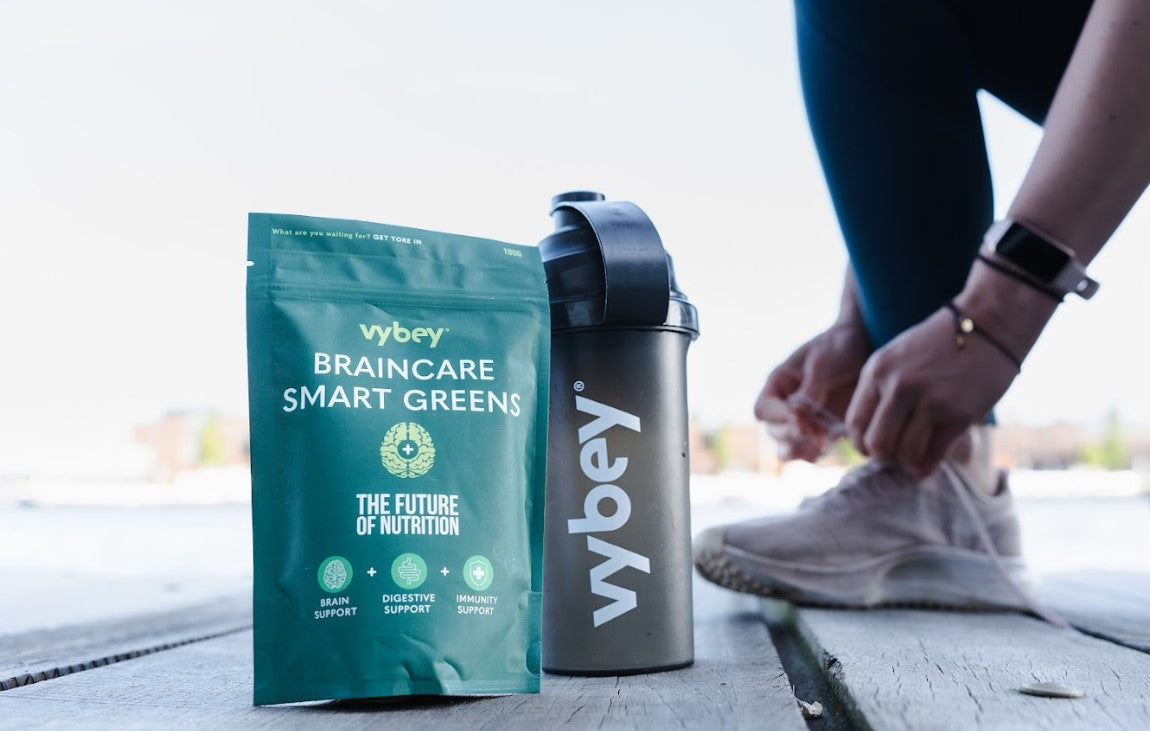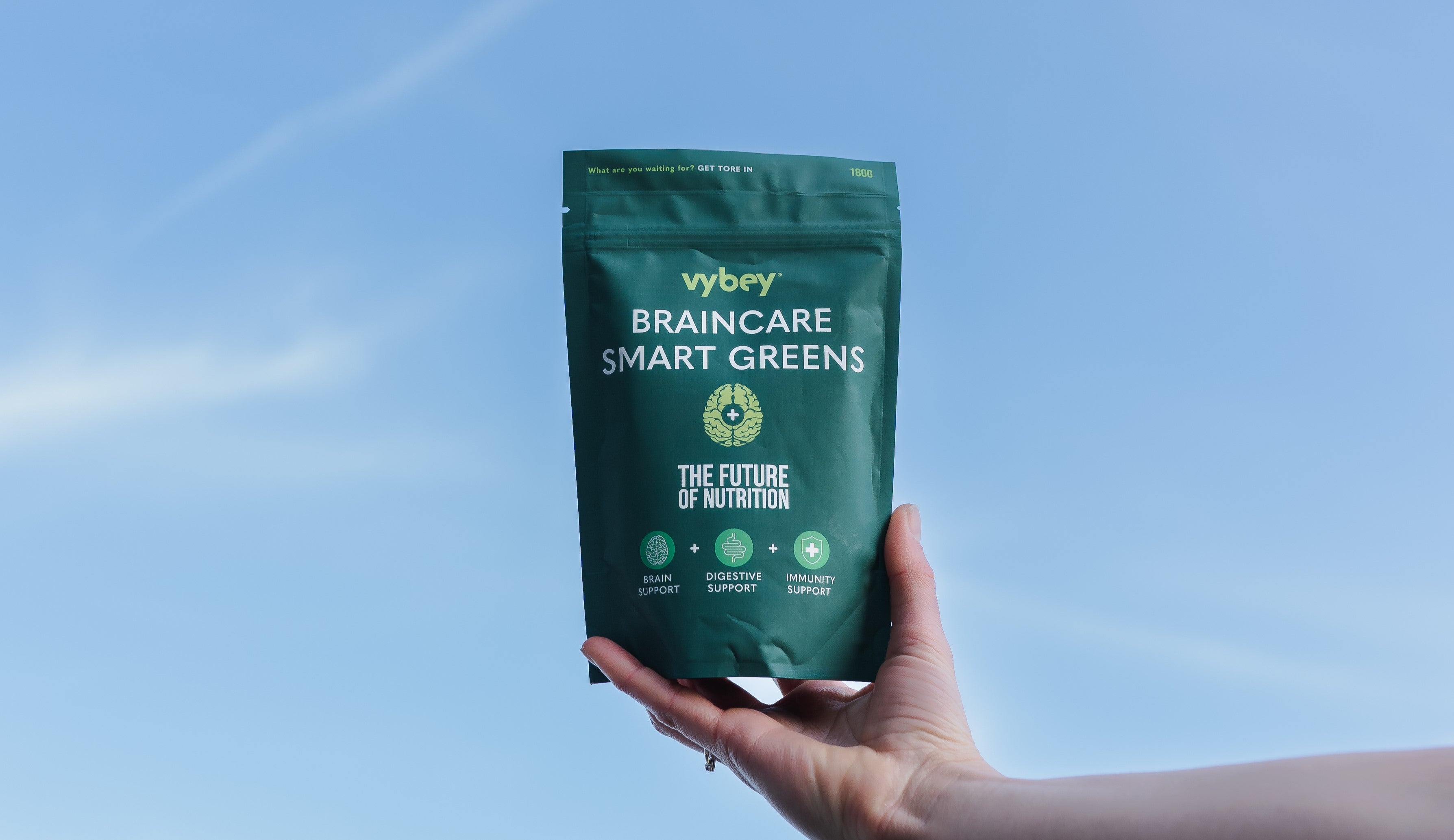The brain is the most important organ in the body, and taking care of it is essential to maintaining your overall health and well-being.
Smart Greens: the newest addition to the vybey product line is heavily brain care ingredient focused. We felt that as one of the most important organs alongside the heart, the brain is often neglected when health concerns occur. As we age it is important, we are replenishing our brain with all the nutrients it needs to perform sufficiently.
Our aim at vybey is to provide you with the best-in-class nutritional products that contain all the nutrients your body needs and what's more important than the needs of your brain?
Our braincare smart greens product perfectly complements our meal replacement powder products and could even be used alongside them.
At vybey we want to provide you, our vybers with as diverse a selection of our braincare Smart Greens as possible with; nutrient-dense vegetable and herb extract, super fruit blend, and digestive and mushroom blend.
Our nutrient-dense vegetable and herb extract is an incredible addition to maintaining a healthy diet, rich in essential vitamins, minerals and antioxidants. Incorporating nutrient-dense vegetables and herbs into your meals ensures multiple health and well-being benefits including improving your brain health, digestion, boosting your immune system, lowering inflammation, and reducing your risk of many chronic diseases such as heart disease, diabetes, and cancer.
Similar to our nutrient-dense vegetable and herb extract, our super fruit blend and digestive and mushroom blend are incredibly rich in nutrients and antioxidants, ready to combat free radicals and prevent possible neurological damage. They are bursting with so many fruits, fibres and mushrooms that will improve your memory, mental fatigue, mental health and overall cognitive function.
What are the benefits of consuming our vybey braincare smart greens?
Brain health leading to improved mental health:
- Increased immunity
- Healthier eyes
- Improved digestion
- Heart health
- Stronger bones
- Increased energy
Brain Health and Improved Mental Health

1. Algal Omega 3 Powder DHA vegan
Omega 3 DHA is one of the most important ingredients for brain health within Smart Greens. It plays a vital role in the development and maintenance of brain cells, helping to support their structure and function. Studies have shown that omega 3 DHA helps to improve memory, focus, and cognitive performance by promoting communication between brain cells[1].
2. Blueberry Extract
Blueberries are rich in phytochemicals such as anthocyanins and caffeic acid which are major contributors to combating oxidative stress, inflammation and other major factors that lead to the development of age-related neurodegenerative diseases[2]. These phytochemicals offer neuroprotective effects that ensure your brain continues to function efficiently for as long as possible.
3. Grapefruit Extract
Grapefruit is a member of the citrus family that represents a considerably rich source of non-essential bioactive compounds, such as flavonoids, in particular a subsect of them, flavanones. Citrus flavonoids are highlighted to have well established anti-inflammatory and anti-oxidative properties[3]. There is also newly emerging evidence to suggest they have an influence upon the function and integrity of the blood-brain barrier.
4. Vitamin D
High levels of vitamin D in your bloodstream is often associated with better health outcomes. Research suggests deficiency in vitamin D is commonly found in elderly individuals and found that when increasing the amount of vitamin D within your diet, more complex memory tasks were able to be completed and blood levels were found to lie within the optimal range[4]. Therefore, increasing your intake of vitamin D your efficient cognitive function is more likely to be maintained as you age.
5. Vitamin B Complex
There are many different foods rich in B vitamins including vegetables such as broccoli, spinach Kale. B1 vitamins have been found to help prevent neurological dysfunction and supplying your brain with other B vitamins such as B6 and B12 will also improve neurocognitive functioning such as learning, language, memory, executive function, and perceptual motor-skills[5].
6. Spinach Powder and Kale Powder
Spinach and kale are both leafy green vegetables that are rich in vitamin D. Vitamin D is essential for maintaining good brain health, as it helps to regulate neurotransmitter production and promotes the growth of nerve cells. Studies have shown that individuals with higher levels of vitamin D are more likely to experience improvements in mood levels[6].
Additionally, these greens also contain other beneficial nutrients such as iron, magnesium, and antioxidants, which can further support brain health and overall well-being.
7. Alfalfa Powder
Alfalfa powder is a good source of several nutrients that are important for brain health, including vitamin K, vitamin C, and antioxidants. Vitamin K is essential for the synthesis of sphingolipids, a type of fat found in brain cells that plays a key role in cognitive function and memory[7]. Alfalfa powder has also been found to contain high levels of vitamin B which are essential to the production and function of neurotransmitters, which are the chemical messages that help regulate mood as well as other brain functions[8].
8. Chlorella Powder
Chlorella powder is a type of algae that contains several nutrients that support brain health. It is rich in chlorophyll, a pigment that has antioxidant and anti-inflammatory properties and may help protect against damage caused by free radicals[9]. Antioxidants are important for brain health; without them free radicals can roam your system and prevent your brain from functioning efficiently.
9. Hemp Protein
Hemp protein is a plant-based protein source that contains several nutrients that may support brain health. It is a good source of essential amino acids, particularly the amino acid arginine, which is a precursor to nitric oxide, a molecule that helps dilate blood vessels and increase blood flow to the brain[10]. Hemp protein also contains omega-3 fatty acids, which are important for brain function and have been linked to a reduced risk of cognitive decline.
10. Peruvian Maca Root Powder
Peruvian maca root powder has been used for centuries as a traditional medicine to enhance fertility and energy. It is rich in vitamins, minerals, and antioxidants, and is particularly high in calcium, potassium, and iron. Maca root powder may help improve mood, reduce anxiety, and stress, and increase libido and sexual function[11].
11. Rhodiola Rosea root extract
Similar to Peruvian Maca Rhodiola Rosea is an adaptogenic herb that has also been used for centuries in traditional medicine to help the body cope with stress. It contains active compounds called rosavins and salidrosides that may help improve cognitive function, reduce fatigue, and enhance physical performance[12]. Rhodiola root powder may also help regulate mood and support healthy immune function.
12. Matcha Green Tea Powder
Matcha Green tea contains large amounts of L-theanine which is a rare amino acid that promotes relaxation and wellbeing by acting upon the brain's functioning through increasing alpha brain activity, regulating relaxing neurotransmitter activity and boosting neuron growth, helping with memory and learning ability[13].
Immunity

1. Spirulina Powder
Spirulina contains compounds that can stimulate the production of immune cells such as natural killer cells and T-cells, which help fight off infections.
Spirulina also has prebiotic properties that promote the production of gut bacteria that is beneficial in maintaining a healthy immune system[14].
2. Chlorella Powder
One of the key benefits of chlorella is that it can help boost immunity by stimulating the production of white blood cells and enhancing the activity of natural killer cells. Additionally, similar to spirulina, chlorella can improve gut health by promoting the growth of beneficial bacteria in the gut, which supports digestion and nutrient absorption. Its detoxifying effects also help to eliminate harmful toxins, leading to better immune function overall[15].
3. Wheat Grass Powder
Wheat Grass is highly beneficial for the immune system, aiding in the killing or slowing down of the growth of certain infections, by stimulating production of immune cells such as lymphocytes and macrophages. This is especially helpful when treating antibiotic resistant infections, or for those allergic to antibiotics.
Wheat Grass also contains vitamins A and C which act as antioxidants which help reduce oxidative stress which can impair the functionality of the immune system[16].
4. Peruvian Maca Root Powder
Although one of the main benefits of Peruvian Maca Root is the boosting of libido in men and women, it is also incredibly beneficial at building a healthy immune system.
Maca Root is rich in antioxidants such as glutathione and superoxide dismutase, which help fight off free radicals such as tobacco smoke or radiation from the sun, protecting these cells allows them to perform efficiently[17].
5. Tomato Fruit Powder
Tomatoes are an excellent source of Vitamin A which stimulates the production and activity of white blood cells which help fight infection and other diseases. Vitamin A also maintains and strengthens mucous membranes which are found inside your nose, mouth, lungs and other organs in your body, protecting them from invasive pathogens[18].
Eye Health

1. Carrot Root Powder
Carrot root powder is a good source of beta-carotene, which is converted into vitamin A in the body and essential for healthy eyes and skin. Vitamin A helps with eyesight through the production of rhodopsin, a protein found in the retina that helps to detect and respond to changes in light. An inadequate intake of vitamin A can lead to a range of vision problems, including night blindness and xerophthalmia, a condition that can cause blindness if left untreated[19].
2. Tomato Fruit Powder
Tomatoes are rich in antioxidants such as Lycopene which protects your eyes from oxidative stress that cause common eye diseases such as age-related macular degeneration and cataract, making it one of the strongest vitamins you can consume for your eyesight[20].
3. Kale Leaf Powder
Similar to tomato powder, kale is rich in nutrients that support the health of our eyes and vision, by reducing the risk of age-related macular degeneration and cataracts. Kale's high concentration of lutein, beta-carotene, and vitamin A, helps keep your retina healthy, sending accurate light signals and visuals to your brain[21].
4. Broccoli Powder
Broccoli is packed with nutrients such as Zeaxanthin and lutein which are two of the best nutrients for your eyes other than Lycopene. They have an incredible ability to prevent oxidation of the retina and the deterioration of our eyes that occurs with age[22]. These nutrients also protect the macula which is the part of the eye responsible for central vision.
5. Algal Omega 3 Powder DHA Vegan
DHA is the major structural and metabolic fatty acid of the retina accounting for 20% of its weight. We are constantly exposed to blue light from the sun but also through our increased use of electronics which release blue light has had distinct negative effects on our retina[23]. Building and maintaining a high level of DHA as well as maintaining a high dose of omega 3 provides protection against the damaging effects of blue light.
Improved Digestion

1. Barley Grass
Barley Grass is rich in dietary fibre, which helps to promote regular bowel movements and prevent constipation, this reduces the risk of digestive disorders such as inflammatory bowel disease[24].
Barley Grass also contains enzymes that aid in the breaking down of food, making it easier for your body to manage, alleviating uncomfortable digestive issues such as bloating, gas, and indigestion.
2. Wheat Grass
Wheat Grass contains high levels of chlorophyll which has been shown to have anti-inflammatory properties, helping to reduce inflammation in the digestive tract, by reducing harmful bacteria while increasing beneficial bacteria, improving digestive movements[25].
3. Chlorella Powder
Supplying your body with sufficient amounts of chlorella has been found to reduce cramps, bloating and diarrhoea. Chlorella contains vitamin D, chlorophyll and beta-carotene which help to fight inflammation in the gut, improving bowel movements and the overall digestive process[26]. Chlorella also prevents the intestine from absorbing dietary and endogenous lipids, reducing lipid risk factors such as high cholesterol levels.
4. Broccoli Powder
Broccoli helps to improve digestive health, forming a compound called indolocarbazole (ICZ), as it is digested, binding to receptors within the intestines to help regulate the probiotic flora necessary to absorb nutrients from food[27]. These nutrients can then be transferred around the body to support other organs and improve overall health.
5. Rhubarb Root Powder
Rhubarb contains fibre that helps keep food moving through your digestive tract, it also contains substances often found in herbal laxatives such as anthraquinones[28]. This helps stimulate bowel movements and encourages the emptying of bowels. In addition to this, rhubarb contains tannins that provide antidiarrheal effects.
Heart Health

1. Spirulina Powder
Protein in spirulina has been found to reduce the body’s absorption of cholesterol, lowering cholesterol levels. This helps keep your arteries clear, reducing the strain on your heart that can lead to heart disease and stroke-causing blood clots[29].
Its protein also reduces triglyceride levels. These are fats in your blood that can contribute to the hardening of arteries, increasing the risk of heart disease, diabetes, and pancreatitis.
2. Barley Grass
Consuming barley grass has been found to reduce bad cholesterol levels. The soluble fibre found within barley grass absorbs the cholesterol before it can make it into your bloodstream, reducing risk of heart attacks and heart disease[30].
3. Broccoli Powder
Broccoli powder is a rich source of fibre, vitamins C and K, and minerals such as calcium and potassium. Broccoli powder contains several compounds that may help support heart health. It is a good source of dietary fibre, which can help lower cholesterol levels and reduce the risk of heart disease. Broccoli powder is also rich in antioxidants, such as sulforaphane and glucoraphanin, which may help protect against oxidative stress and inflammation that can damage blood vessels and increase the risk of heart disease[31].
4. Kale Leaf Powder
Kale is beneficial for heart health due the high content of compounds such as potassium, fibre, folate, and calcium that help reduce inflammation, lower cholesterol levels, and help regulate blood pressure[32]. High levels of potassium and fibre regulate blood pressure and reduce triglycerides which is a type of fat that builds up, hardening the arteries, reducing blood flow causing heart attacks, and strokes, as well as heart disease.
5. Hemp Protein
Hemp protein has an excellent ratio of omega 3 and omega 6 fatty acids, these are essential fatty acids that help to maintain good cardiovascular health. There are many benefits to a sufficient amount of these fatty acids such as reducing the risk of developing an irregular heartbeat as well as slowing the build-up of plaque which hardens and blocks the arteries[33].
Bone Health

1. Spinach Leaf Powder
Spinach is incredibly nutrient-dense, rich in calcium, vitamin K and other nutrients beneficial to bone health. Calcium is the most important mineral for bone health, helping to maintain strong and flexible bones[34]. One cup of cooked spinach can provide your body with 25% of the recommended daily intake of calcium.
2. Beetroot Powder
Beetroot is also nutrient dense, with one cup of cooked beetroot providing you with 4% of your recommended daily calcium intake. Other nutrients within beetroot such as Vitamin C, iron, magnesium and potassium are all essential for bone health. Vitamin C is essential for collagen synthesis, a key component of bone tissue, which significantly increases the organic substance of the bone[35].
3. Barley Grass
Barley grass is rich in copper, neogen and magnesium which are all essential for maintaining the good condition of bones, as they all help to absorb the calcium that is being consumed. Without sufficient magnesium, bones can become brittle and prone to fractures.
4. Tomato Fruit powder
As mentioned earlier tomatoes are rich in Lycopene, a powerful antioxidant that has been found to improve bone density and reduce the risk of osteoporosis also referred to as a ‘silent disease’ that weakens bones to a point that they can break easily[36]. Lycopene works by reducing oxidative stress and inflammation, which can contribute to altering the bone modelling process which can lead to metabolic bone diseases.
Increased Energy

1. Rhodiola Rosea Root Powder
Rhodiola Rosea is often used as pre-workout powder, as it helps to boost energy levels and increase athletic performance. This is due to a group of compounds often found called rosavins, which have often shown to increase energy, reduce fatigue and improve cognitive function[37].
2. Beetroot Powder
Beetroot has been found to reduce the oxygen needed during ATP synthesis, this decreased amount of oxygen increases the efficiency of converting ATP into energy[38]. This then allows energy to be quickly transferred around the body, helping to slow down fatigue.
3. Matcha Green Tea Powder
Matcha is incredibly helpful at fighting fatigue, with a combination of small amounts of caffeine and naturally occurring amino acids such as L-theanine which is linked to mental alertness, it is able to boost energy levels, keeping you engaged and prepared to tackle the rest of your day[39].
4. Peruvian Maca Root Powder
Peruvian Maca is essential in supporting your whole endocrine system in order to produce the correct number of hormones, in doing so it helps to regulate hormones such as cortisol and adrenaline, both of which are associated with stress and fatigue[40]. It is important to preserve adrenaline as it increases energy, improves blood flow to the brain and muscles and ensures we are ready to respond to a threat.
These nutrients listed above have multiple life-changing benefits for both our brains and our bodies. Supplying our brain with the above nutrients is key to supporting it through the aging process and ensuring that we can stay active, tackling daily tasks and new activities.
[1] DiNicolantonio, J.J. and O’Keefe, J.H. (2020) “The importance of marine omega-3s for brain development and the prevention and treatment of behavior, mood, and other brain disorders,” Nutrients, 12(8), p. 2333. Available at: https://doi.org/10.3390/nu12082333.
[2] Essa, M.M. et al. (2014) “Neuroprotective effects of Berry Fruits on neurodegenerative diseases,” Neural Regeneration Research, 9(16), p. 1557. Available at: https://doi.org/10.4103/1673-5374.139483.
[3] Pontifex, M.G. et al. (2021) “Citrus polyphenols in Brain Health and disease: Current perspectives,” Frontiers in Neuroscience, 15. Available at: https://doi.org/10.3389/fnins.2021.640648.
[4] Latimer, C.S. et al. (2014) “Vitamin D prevents cognitive decline and enhances hippocampal synaptic function in aging rats,” Proceedings of the National Academy of Sciences, 111(41). Available at: https://doi.org/10.1073/pnas.1404477111.
[5] Balk, E. et al. (2006) “B vitamins and berries and age-related neurodegenerative disorders: Evidence report/technology assessment, number 134,” PsycEXTRA Dataset [Preprint]. Available at: https://doi.org/10.1037/e663022007-001.
[6] Anjum, I. et al. (2018) “The role of Vitamin D in brain health: A mini literature review,” Cureus [Preprint]. Available at: https://doi.org/10.7759/cureus.2960.
[7] Harrison, F.E. and May, J.M. (2009) “Vitamin C function in the brain: Vital role of the ascorbate transporter SVCT2,” Free Radical Biology and Medicine, 46(6), pp. 719–730. Available at: https://doi.org/10.1016/j.freeradbiomed.2008.12.018.
[8] Lewis, J.E. et al. (2013) “The effect of methylated vitamin B complex on depressive and anxiety symptoms and quality of life in adults with depression,” ISRN Psychiatry, 2013, pp. 1–7. Available at: https://doi.org/10.1155/2013/621453.
[9] Gopi, S., et al. (2014) “A short review on the medicinal properties of chlorophyll juice,” Asian Journal of Pharmaceutical Technology and Innovation, 2(9), pp. 89-94.
[10] Lieberman, H. (1999) “The Role of Protein and Amino Acids in Sustaining and enhancing performance” Washington. DC: National Academy of Science.
[11] Brooks, N.A. et al. (2008) “Beneficial effects of lepidium meyenii (MACA) on psychological symptoms and measures of sexual dysfunction in postmenopausal women are not related to estrogen or androgen content,” Menopause, 15(6), pp. 1157–1162. Available at: https://doi.org/10.1097/gme.0b013e3181732953
[12] Lekomtseva, Y., Zhukova, I. and Wacker, A. (2017) “Rhodiola Rosea in subjects with prolonged or chronic fatigue symptoms: Results of an open-label clinical trial,” Complementary Medicine Research, 24(1), pp. 46–52. Available at: https://doi.org/10.1159/000457918.
[13] Hidese, S. et al. (2019) “Effects of L-theanine administration on stress-related symptoms and cognitive functions in healthy adults: A randomized controlled trial,” Nutrients, 11(10), p. 2362. Available at: https://doi.org/10.3390/nu11102362.
[14] Slavin J. (2013). Fiber and prebiotics: mechanisms and health benefits. Nutrients, 5(4), 1417–1435. https://doi.org/10.3390/nu5041417
[15] Bito, T., et al. (2020). “Potential of Chlorella as a dietary supplement to promote human health.” Nutrients. 12. Available at: https://www.researchgate.net/publication/343781983_Potential_of_Chlorella_as_a_Dietary_Supplement_to_Promote_Human_Health.
[16] National Institutes of Health. (2021) “Vitamin C” [Fact Sheet]. Available at: https://ods.od.nih.gov/factsheets/VitaminC-HealthProfessional/.
[17] Fei, W., et al. (2020) “The effects of aqueous extract of maca on energy metabolism and immunoregulation.” European Journal of Medical Research. 25(1). Available at:https://www.researchgate.net/publication/.
[18] National Institutes of Health. (2022) “Vitamin A and Carotenoids” [Fact Sheet]. Available at:https://ods.od.nih.gov/factsheets/VitaminA-Consumer/.
[19] National Institutes of Health. (2022) “Vitamin A and Carotenoids” [Fact Sheet]. Available at:https://ods.od.nih.gov/factsheets/VitaminA-Consumer/.
[20] Schleicher, M., Weikel, K., Garber, C., & Taylor, A. (2013). Diminishing risk for age-related macular degeneration with nutrition: a current view. Nutrients, 5(7), 2405–2456. https://doi.org/10.3390/nu5072405
[21] National Institutes of Health. (2022) “Vitamin A and Carotenoids” [Fact Sheet]. Available at:https://ods.od.nih.gov/factsheets/VitaminA-Consumer/.
[22] Lawrenson, J. G., & Downie, L. E. (2019). Nutrition and Eye Health. Nutrients, 11(9), 2123. https://doi.org/10.3390/nu11092123
[23] Merle, B. M., Benlian, P., Puche, N., Bassols, A., Delcourt, C., Souied, E. H., & Nutritional AMD Treatment 2 Study Group (2014). Circulating omega-3 Fatty acids and neovascular age-related macular degeneration. Investigative ophthalmology & visual science, 55(3), 2010–2019. https://doi.org/10.1167/iovs.14-13916
[24] Slavin J. (2013). Fiber and prebiotics: mechanisms and health benefits. Nutrients, 5(4), 1417–1435. https://doi.org/10.3390/nu5041417
[25] A. Parnell, J. and A. Reimer, R. (2012) “Prebiotic fiber modulation of the gut microbiota improves risk factors for obesity and the metabolic syndrome,” Gut Microbes, 3(1),29–34. Available at: https://doi.org/10.4161/gmic.19246.
[26] Bito, T., et al. (2020). “Potential of Chlorella as a dietary supplement to promote human health.” Nutrients. 12. Available at:
[27] Hubbard, T.D. et al. (2017) “Dietary broccoli impacts microbial community structure and attenuates chemically induced colitis in mice in an AH receptor dependent manner,” Journal of Functional Foods, 37, pp. 685–698. Available at: https://doi.org/10.1016/j.jff.2017.08.038.
[28] Slavin J. (2013). Fiber and prebiotics: mechanisms and health benefits. Nutrients, 5(4), 1417–1435. https://doi.org/10.3390/nu5041417
[29] Karkos, P. D., et al. (2011). Spirulina in clinical practice: evidence-based human applications. Evidence-based complementary and alternative medicine : eCAM, 531053. https://doi.org/10.1093/ecam/nen058
[30] Slavin J. (2013). Fiber and prebiotics: mechanisms and health benefits. Nutrients, 5(4), 1417–1435. https://doi.org/10.3390/nu5041417
[31] Conzatti, A., et al. (2014). Clinical and molecular evidence of the consumption of broccoli, glucoraphanin and sulforaphane in humans. Nutricion hospitalaria, 31(2), 559–569. https://doi.org/10.3305/nh.2015.31.2.7685
[32] Slavin J. (2013). Fiber and prebiotics: mechanisms and health benefits. Nutrients, 5(4), 1417–1435. https://doi.org/10.3390/nu5041417
[33] Jain, A. P., et al. (2015). Omega-3 fatty acids and cardiovascular disease. European review for medical and pharmacological sciences, 19(3), 441–445.
[34] Vannucci, L., et al. (2018). Calcium Intake in Bone Health: A Focus on Calcium-Rich Mineral Waters. Nutrients, 10(12), 1930. https://doi.org/10.3390/nu10121930
[35] National Institutes of Health. (2021) “Vitamin C” [Fact Sheet]. Available at: https://ods.od.nih.gov/factsheets/VitaminC-HealthProfessional/.
[36] Walallawita, S., et al. (2020). Potential Role of Lycopene in the Prevention of Postmenopausal Bone Loss: Evidence from Molecular to Clinical Studies. International journal of molecular sciences, 21(19), 7119. https://doi.org/10.3390/ijms21197119.
[37] Lekomtseva, Y., Zhukova, I. and Wacker, A. (2017) “Rhodiola Rosea in subjects with prolonged or chronic fatigue symptoms: Results of an open-label clinical trial,” Complementary Medicine Research, 24(1), pp. 46–52. Available at: https://doi.org/10.1159/000457918.
[38] Domínguez, R.,et al. (2017). Effects of Beetroot Juice Supplementation on Cardiorespiratory Endurance in Athletes. A Systematic Review. Nutrients, 9(1), Available at:https://doi.org/10.3390/nu9010043
[39] Hidese, S. et al. (2019) “Effects of L-theanine administration on stress-related symptoms and cognitive functions in healthy adults: A randomized controlled trial,” Nutrients, 11(10), p. 2362. Available at: https://doi.org/10.3390/nu11102362.
[40] Fei, W., et al. (2020) “The effects of aqueous extract of maca on energy metabolism and immunoregulation.” European Journal of Medical Research. 25(1). Available at:https://www.researchgate.net/publication/.






Comments (0)
Back to vybey blogs